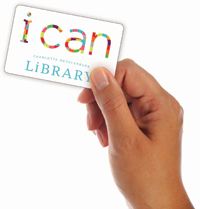Hosting a Library Card Drive at Your School
Tools to host a library card drive at your school
What little card costs nothing at all, and is one of your best back-to-school tools?
Your library card!
The Library has a wealth of tools and services that support educators and students during the school year. Encouraging children to read and use the library is the best thing you can do to help them to do better in school and continue learning throughout their lives.
Encouragement can start with a library card. Here’s how you can conduct a library card drive at your school. Keep in mind that students at Charlotte-Mecklenburg Schools already have ONE Access library accounts. Learn more at cmlibrary.org/oneaccess.
 Step 1: Teachers, download the application
Step 1: Teachers, download the application
We've provided a .pdf library card application which you can photocopy for students. There are two pages in the document - page one is an application for children 11 and under; page two is for ages 12 and up. Download the application in English or Spanish.
Step 2: Send a library card application home with each student
The applications include a message to parents, instructions, and a list of libraries where parents can obtain a library card. Parents bring the completed application to their nearest library to complete the application process and obtain their child’s card.
That’s it!
Why encourage students to have a library card?
Children who read, succeed! Reading well and frequently is the key to being successful in school and subsequently in our society. Regular library use helps create strong readers.
Reading is an essential skill for all students because literacy (reading) is embedded in all parts of the curriculum. The more children read, the better their fluency, vocabulary and comprehension.
There is a direct correlation between the number and variety of reading materials available to a child and standardized test scores (Educational Testing Service, Princeton, NJ). The more reading materials a child has, the more successful they will be in their educational pursuits.
There is a connection between early reading and literacy building activities in the home and later achievement in school. Children who don't get reading building blocks early in life are more likely to be at low levels of academic performance by age ten. Students who are struggling with reading in the third grade are likely to have trouble in all subjects, because reading is so essential to learning in grades four through 12.
Having a library card is a critical first step in becoming a lifelong library user, and is the gateway to obtaining full access to a range of services within the library and online. When children possess their own library card, a door opens for them to become regular library users. They are also more likely to view themselves as readers, and a child's self-identity as a reader is one predictor of their future success with reading. Children who are exposed to reading and other cultural experiences before entering school have a better chance at formal learning success. (Becoming a Nation of Readers, Commission on Reading).
Together we can build readers who will be prepared to succeed in school, the workplace, and in life.
